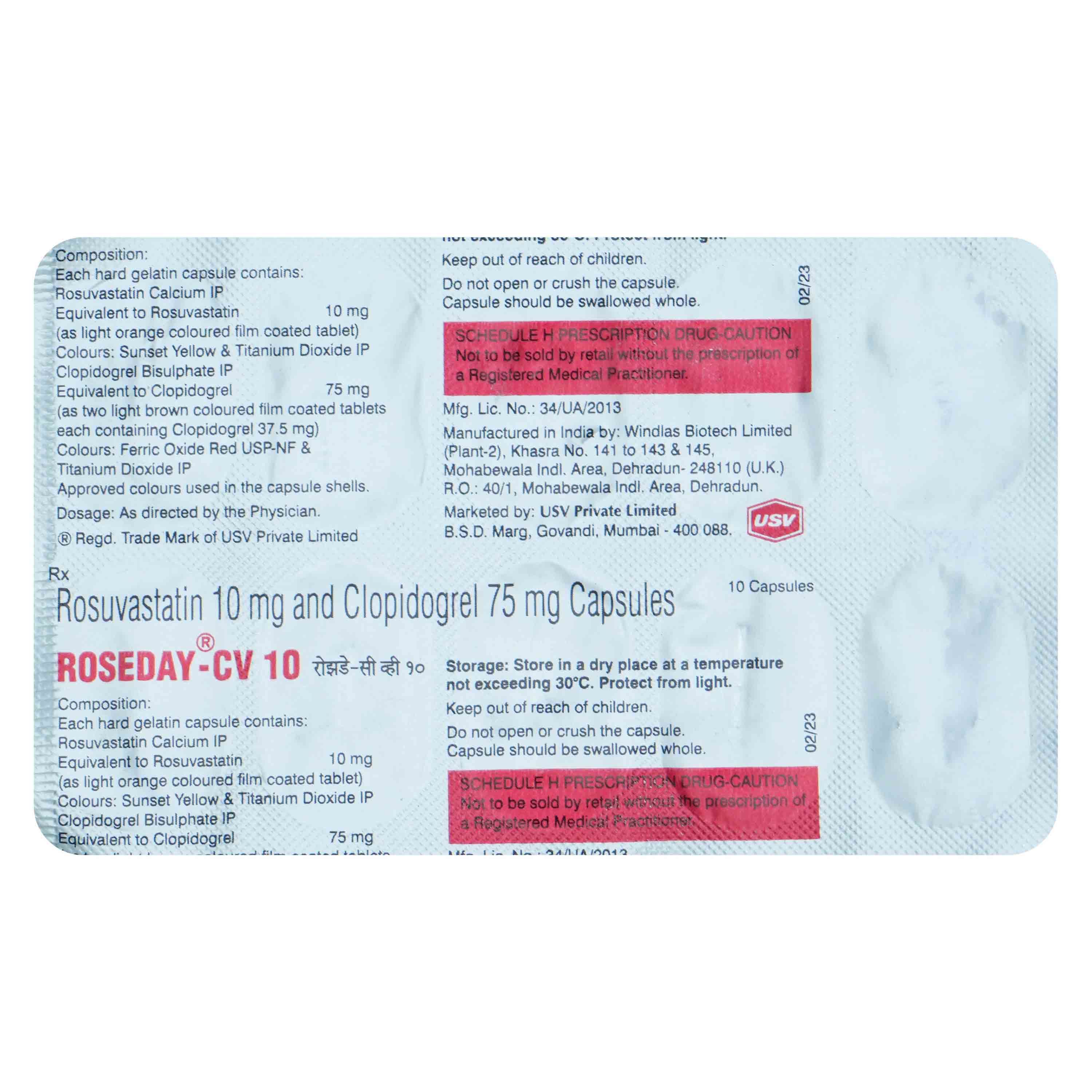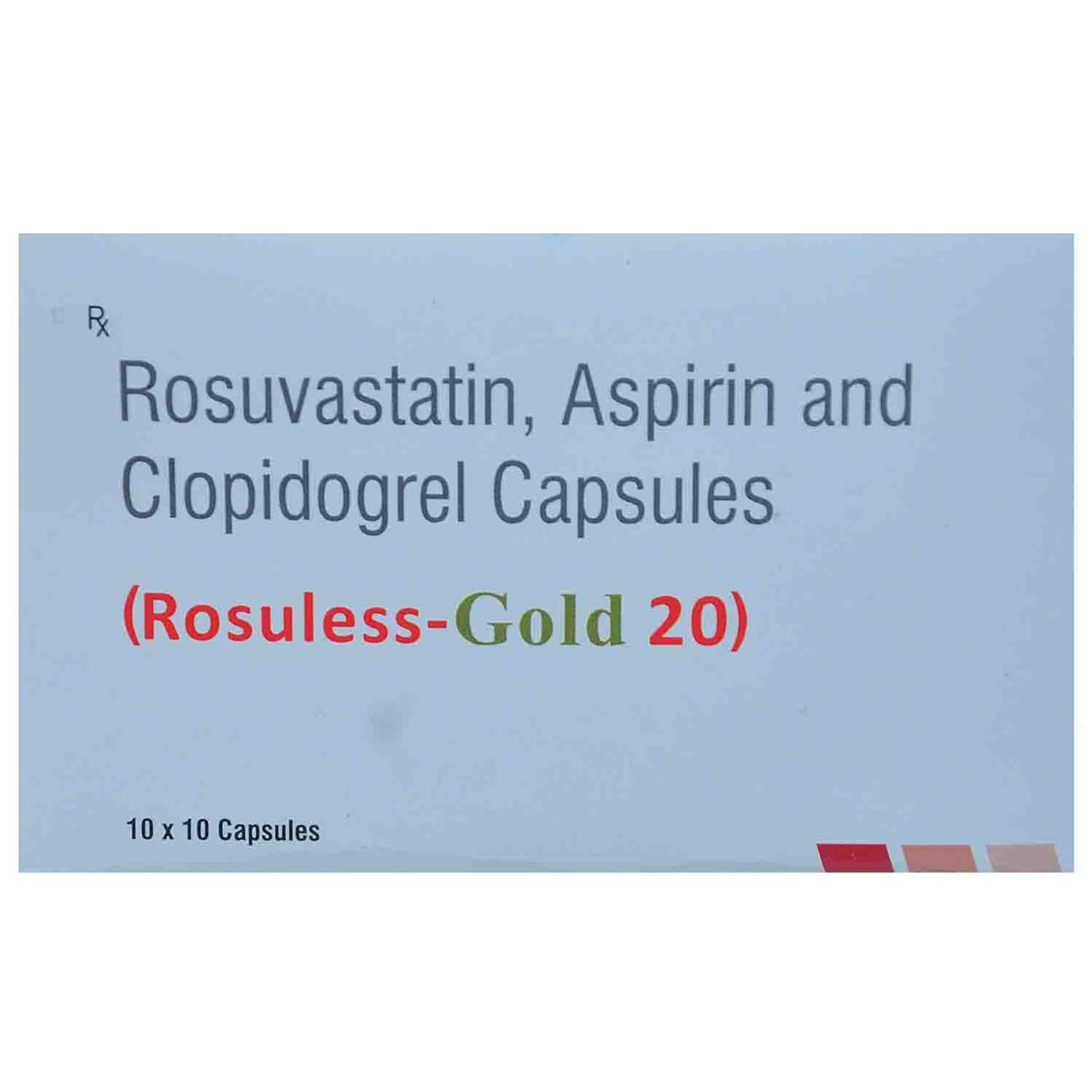Rosuvastatin+clopidogrel
About Rosuvastatin+clopidogrel
Clopidogrel+rosuvastatin is a combination of two types of medicines: a statin and an antiplatelet. It is used to help prevent heart attacks, strokes, and chest pain (angina) in people who are at high risk of heart problems. A heart attack happens when the coronary arteries, blood vessels that supply blood and oxygen to the heart, become blocked by fatty deposits (plaques), including cholesterol. These plaques narrow the arteries, leading to atherosclerosis and coronary artery disease, which are the leading causes of most heart attacks.
Clopidogrel+rosuvastatin contains two active ingredients that work together to protect your heart. Rosuvastatin lowers cholesterol production in the liver. It reduces bad cholesterol (LDL) and triglycerides (TG) while increasing good cholesterol (HDL). Clopidogrel is an antiplatelet medicine (blood thinner) that prevents blood cells (platelets) from clumping together and forming clots. Together, these medicines improve blood flow and reduce the risk of blocked arteries, helping prevent serious heart and brain complications.
Take Clopidogrel+rosuvastatin exactly as prescribed by your doctor, usually once a day with or without food. Do not skip doses or stop taking the medicine without consulting a doctor. Common side effects may include headache, nausea, dizziness, swollen ankles (oedema), and in rare cases, slow heart rate. Most side effects are mild and go away on their own, but contact your doctor if they persist or worsen. If you miss a dose, take it as soon as you remember. If it’s almost time for your next dose, skip the missed one. Do not take two doses at the same time.
Do not stop taking Clopidogrel+rosuvastatin without consulting your doctor, as stopping it suddenly may increase your risk of heart attack or stroke. Please inform your doctor of any medical conditions or allergies you may have before starting Clopidogrel+rosuvastatin. Always inform your doctor that you are taking Clopidogrel+rosuvastatin before any surgery or if a new medicine is prescribed. Clopidogrel+rosuvastatin should not be used during pregnancy or breastfeeding, as it may harm the baby. It is also not recommended for use in children below 10 years.
Uses of Rosuvastatin+clopidogrel
Medicinal Benefits
- Clopidogrel+rosuvastatin effectively reduces the risk of heart attacks and strokes by lowering bad cholesterol and preventing blood clots.
- Slows the progression of atherosclerosis, helping keep arteries open and reducing cardiovascular strain.
- Provides dual protection. Rosuvastatin stabilises cholesterol plaques, while Clopidogrel prevents clot formation on them.
- Improves long-term cardiovascular outcomes in patients with coronary artery disease or those who’ve had angioplasty or bypass surgery.
- Lowers the chance of future cardiovascular events in high-risk individuals or those with a history of heart attack or stroke.
Directions for Use
- Take Clopidogrel+rosuvastatin with or without food as advised by your doctor.
- It is recommended to follow your doctor’s recommendations regarding the dosage and duration.
- Swallow it as a whole with a glass of water.
- Do not crush, chew or break it.
Storage
Side Effects of Rosuvastatin+clopidogrel
- Stomach bleeding
- Gastrointestinal bleeding
- Nose bleeding
- Rash
- Diarrhoea
- Stomach ulcer
- Muscle disease (myopathy, rhabdomyolysis)
- Abdominal pain
Drug Warnings
- Do not take Clopidogrel+rosuvastatin if you are allergic to any of its ingredients.
- Do not use Clopidogrel+rosuvastatin if you are pregnant, planning to become pregnant, or breastfeeding, as Rosuvastatin may harm the unborn baby and is strictly contraindicated during pregnancy.
- Avoid Clopidogrel+rosuvastatin if you have active liver disease or any active bleeding conditions, such as stomach ulcers or brain haemorrhage, unless specifically advised by your doctor.
- Inform your doctor about all medications you are taking, especially antibiotics (like clarithromycin), antifungals (like itraconazole), HIV medicines, or blood thinners like warfarin, due to the risk of serious interactions.
- Tell your doctor you are taking Clopidogrel+rosuvastatin before any surgery or if a new medicine is being prescribed, to avoid potential complications or interactions.
- Do not stop taking Clopidogrel+rosuvastatin suddenly without medical advice, as this may increase the risk of heart attack, stroke, or other serious cardiovascular events.
Drug Interactions
Drug-Drug Interactions: Clopidogrel+rosuvastatin may interact with antibiotics (erythromycin, clarithromycin), anti-HIV drugs (ritonavir, lopinavir, darunavir, atazanavir, indinavir) and antifungal (itraconazole), blood thinners (warfarin, heparin), anti-arthritis drug (colchicine), oral contraceptives, heart-related medicine (digoxin) and immune system affecting drug (cyclosporine).
Drug-Food Interactions: Alcoholic beverages and grapefruit or its juice intake should be avoided with Clopidogrel+rosuvastatin as it may interact with Clopidogrel+rosuvastatin to produce unpleasant side effects like muscle problems and bleeding disorder.
Drug-Disease Interactions: Clopidogrel+rosuvastatin should not be given to the patients with active liver disease, active bleeding issues (like peptic ulcer, brain haemorrhage), muscle problems or musculoskeletal problems (myopathy, rhabdomyolysis), asthma, and purpura (blood leakage under the skin).
Drug-Drug Interactions Checker List:
Safety Advice

Alcohol
unsafeClopidogrel+rosuvastatin should not be taken with alcohol as it may worsen your liver condition with increased secretion of liver enzymes like transaminase. Keep your doctor informed if you drink alcohol.

Pregnancy
unsafeClopidogrel+rosuvastatin contains Rosuvastatin, which is a pregnancy category X medicine. It may cause harm to both the pregnant mother and the fetus. Hence, it is not recommended for pregnant women and those who are planning for a pregnancy. Your doctor may prescribe it only in extreme cases.

Breast Feeding
cautionTake Clopidogrel+rosuvastatin only when prescribed, it is known to pass on in a limited quantity via breast milk to the child.

Driving
cautionDrive with caution, Clopidogrel+rosuvastatin usually causes blurry vision and may affect driving ability.

Liver
cautionClopidogrel+rosuvastatin to be taken with caution, especially if you have a history of liver diseases/conditions. The dose may have to be adjusted by your doctor.

Kidney
cautionClopidogrel+rosuvastatin to be taken with caution, especially if you have a history of kidney diseases/conditions. The dose may have to be adjusted by your doctor.

Children
cautionClopidogrel+rosuvastatin is not recommended for children below the age of 10 years. The safety and effectiveness of Clopidogrel+rosuvastatin have not been established in children due to limited testing of Clopidogrel+rosuvastatin on children by competent authorities worldwide.
Habit Forming
Diet & Lifestyle Advise
- Follow a Mediterranean or DASH diet rich in vegetables, fruits, whole grains, legumes, nuts, and healthy fats, such as olive oil, which has been shown to reduce the risk of cardiovascular events.
- Limit your intake of saturated fats and eliminate trans fats to lower LDL cholesterol and reduce your risk of atherosclerosis.
- Reduce sodium intake to less than 2,300 mg per day to help control blood pressure and lower the risk of stroke and heart disease.
- Engage in at least 150 minutes of moderate aerobic exercise per week, such as brisk walking, swimming, or cycling, to improve heart health and cholesterol levels.
- Quit smoking and avoid secondhand smoke exposure, as tobacco significantly increases the risk of clot formation and arterial damage.
- Limit alcohol consumption to no more than one standard drink per day for women and two for men, as excessive alcohol raises blood pressure and cardiovascular risk.
- Maintain a healthy weight (BMI 18.5–24.9); even modest weight loss improves cholesterol, blood pressure, and blood sugar control.
- Manage blood sugar effectively, especially in patients with diabetes, to prevent accelerated vascular damage and cardiovascular complications.
- Reduce chronic stress through techniques like mindfulness, relaxation, or yoga, and aim for 7–8 hours of quality sleep to support overall cardiovascular health.
- Take medications like Rosuvastatin and Clopidogrel exactly as prescribed, and attend regular medical check-ups to monitor lipid levels, clotting function, and overall cardiovascular risk.
Patients Concern
Disease/Condition Glossary
Heart attack: Heart attack is when your coronary arteries (blood vessels supplying blood and oxygen to the heart) become blocked due to the build-up of fats (plaque), including cholesterol. These plaques narrow the arteries, leading to atherosclerosis and coronary artery disease, which is mainly responsible for most heart attacks.
Stroke: A stroke occurs when the blood and oxygen supply to the brain are blocked or reduced. As a result, the brain tissue is deprived of getting oxygen and nutrients. After a few minutes, brain cells (neurons) start to die. A stroke is a medical emergency; immediate treatment is required. It can cause brain damage, coma or even death.
Atherosclerosis: Atherosclerosis occurs when fats, cholesterol, and other substances known as plaque deposit on your artery walls and restrict blood flow. This plaque formation triggers blood clots, narrows the artery's size, and hardens it. This, in turn, can lead to various heart complications like atherosclerosis, heart attack, heart-related chest pain (angina), and stroke. However, it can also affect the body's arteries apart from the heart.
FAQs
Clopidogrel+rosuvastatin is used to prevent heart attacks and strokes in the future. It lowers the raised level of cholesterol and fats (triglycerides) in the body.
Clopidogrel+rosuvastatin is composed of two medicines, namely: Rosuvastatin and Clopidogrel. Rosuvastatin is a lipid-lowering medication that inhibits the enzyme responsible for producing cholesterol in the body. As a result, it lowers the bad cholesterol (low-density lipoproteins or LDL) and triglycerides (TG), and increases the levels of good cholesterol (high-density lipoproteins or HDL). Clopidogrel is a blood thinner (anticoagulant) that collectively prevents the formation of clots in the blood vessels. Together, Clopidogrel+rosuvastatin reduces the increased levels of bad cholesterol (low-density lipoprotein and triglycerides) and prevents blood clots, thereby reducing the risk of heart attack, stroke, and heart-related chest pain (angina).
Yes, Clopidogrel+rosuvastatin contains clopidogrel that prevents blood clotting. It works by preventing platelets (a type of blood cell) from sticking together and forming clots, thereby preventing heart attacks and strokes.
No, Clopidogrel+rosuvastatin contains Rosuvastatin, pregnancy category X medicine, and can harm both pregnant mother and unborn baby. Even if you are planning for pregnancy, tell your doctor that you are using Clopidogrel+rosuvastatin.
If you accidentally take an overdose of Clopidogrel+rosuvastatin, you may have liver problems (increased secretion of liver enzymes) and bleeding complications. If problems persist, please go to the nearest clinic or hospital immediately.
It would be best if you had total lipid profile (TG, HDL, LDL, VLDL, TC) and Blood coagulation tests like Complete blood count (CBC), Factor V assay, Fibrinogen Test, Prothrombin time (PT or PT-INR), Platelet count, Thrombin time and Bleeding time to analyze your blood clot timing and cholesterol level.
Do not drink grapefruit juice while taking Clopidogrel+rosuvastatin. Grapefruit juice may increase the blood-thinning effect of your medicine.
Yes, prolonged use of Clopidogrel+rosuvastatin may cause muscle diseases like myopathy and rhabdomyolysis. So if you feel any musculoskeletal pain after taking Clopidogrel+rosuvastatin, consult your doctor about this issue.
Yes, taking Clopidogrel+rosuvastatin can increase bleeding risk as it contains aspirin and clopidogrel, which belong to a class of blood-thinning agents. Therefore, please exercise caution when shaving, cutting fingernails or toenails, or using sharp objects to prevent bleeding. Before undergoing any surgical procedure, please inform your doctor that you are taking Clopidogrel+rosuvastatin.
Consult your doctor before taking other medications while on treatment with Clopidogrel+rosuvastatin to prevent any potential interactions. Let the doctor know if you are taking antibiotics, anti-HIV drugs, antifungal, blood thinners, anti-arthritis medicines, oral contraceptives, cardiac medicines or immunosuppressants.
If you are due to undergo any surgery or dental procedure, inform the doctor that you are taking Clopidogrel+rosuvastatin. The doctor might ask you to stop Clopidogrel+rosuvastatin before surgery as it might increase the risk of bleeding.
Follow a healthy diet and exercise regularly. Avoid smoking and alcohol consumption. Manage stress by doing meditation. Be cautious while using sharp objects.
It might be safe to use paracetamol while taking Clopidogrel+rosuvastatin as other painkillers may increase the risk of bleeding. However, consult the doctor before using any painkiller medicines.
Side effects of Clopidogrel+rosuvastatin include headaches, ankle swelling due to fluid retention (oedema), slow heart rate, and nausea. If the side effects are persistent, reach out to your doctor.





